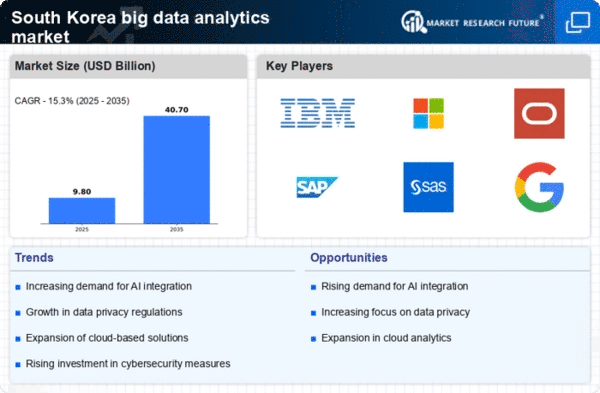Increased Focus on Cybersecurity
As cyber threats become more sophisticated, the focus on cybersecurity is emerging as a crucial driver for the big data-analytics market. In South Korea, organizations are increasingly utilizing big data analytics to enhance their cybersecurity measures. By analyzing vast datasets, companies can identify patterns and anomalies that may indicate potential security breaches. The market for cybersecurity analytics is projected to grow at a CAGR of 15% over the next five years, reflecting the urgent need for robust security solutions. This trend underscores the importance of integrating analytics into cybersecurity strategies, as organizations seek to protect sensitive data and maintain customer trust. Consequently, the big data-analytics market is likely to see increased investment in analytics tools that specifically address cybersecurity challenges, thereby fostering growth in this segment.
Expansion of Internet of Things (IoT)
The proliferation of Internet of Things (IoT) devices is significantly influencing the big data-analytics market. In South Korea, the number of connected devices is projected to reach over 30 million by 2026, generating vast amounts of data that require sophisticated analytics for interpretation. This surge in data generation presents both challenges and opportunities for businesses. Companies are increasingly investing in big data analytics solutions to process and analyze the data collected from IoT devices, enabling them to derive actionable insights. The integration of IoT with big data analytics is expected to enhance operational efficiencies and drive innovation across various sectors, including manufacturing, healthcare, and smart cities. As organizations adapt to this evolving landscape, the demand for advanced analytics tools is likely to escalate, further propelling the growth of the market.
Growing Importance of Data Governance
The growing importance of data governance is becoming a key driver for the big data-analytics market. In South Korea, organizations are increasingly recognizing the need for robust data governance frameworks to ensure data quality, compliance, and security. As regulatory requirements become more stringent, businesses are investing in analytics solutions that facilitate effective data management and governance. This trend is reflected in the fact that over 60% of companies in South Korea have implemented data governance policies to mitigate risks associated with data handling. The emphasis on data governance not only enhances the reliability of analytics outcomes but also fosters trust among stakeholders. Consequently, the big data-analytics market is likely to experience growth as organizations prioritize governance initiatives to support their analytics strategies.
Emergence of Advanced Analytics Technologies
The emergence of advanced analytics technologies, such as predictive and prescriptive analytics, is reshaping the big data-analytics market. In South Korea, businesses are increasingly adopting these technologies to gain deeper insights and make more informed decisions. Predictive analytics, for instance, allows organizations to forecast future trends based on historical data, while prescriptive analytics provides recommendations for optimal decision-making. This shift towards advanced analytics is expected to drive market growth, as companies seek to leverage data for strategic advantage. The adoption of these technologies is likely to enhance operational efficiencies and improve customer engagement, positioning organizations to respond effectively to market dynamics. As the demand for advanced analytics continues to rise, the big data-analytics market is poised for significant expansion.
Rising Demand for Data-Driven Decision Making
The increasing emphasis on data-driven decision making is a pivotal driver for the big data-analytics market. Organizations in South Korea are recognizing the value of leveraging data to enhance operational efficiency and improve customer experiences. According to recent statistics, approximately 70% of businesses in South Korea have adopted data analytics to inform strategic decisions. This trend is likely to continue as companies seek to gain a competitive edge in their respective industries. The big data-analytics market is thus positioned to benefit from this growing demand, as firms invest in advanced analytics tools and technologies to harness insights from vast datasets. The integration of analytics into business processes is expected to drive market growth, as organizations strive to optimize performance and respond swiftly to market changes.
















